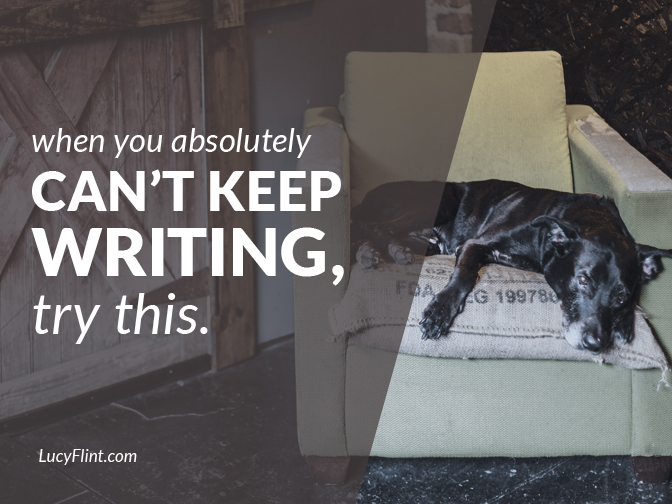Let's Be Rebels: Take 15 Minutes to Upgrade Your Creativity
/I'm in the mood to try something wildly countercultural. After all: It's Monday. Still the beginning of a new year. And we're creative people: switching things up is good for our souls.
So why not try a little rebellion, right? Sound good?
Cool. Here's what we're going to do:
We're going to not be afraid of being bored.
Unafraid of blank moments in a day. Not at all worried about those minutes that have nothing scheduled, and nothing happening.
No more hyperplanning around the possibility of "nothing to do."
I don't know about you, but I apparently have this protective reflex anytime I have a spare few minutes: I'll immediately cram them full of distractions, media, and busyness.
Instagram, Twitter, random Internet searches. Music, podcasts, or a crappy TV show that I don't care about and won't remember.
And if all that fails, my brain runs a list of dozens of things that maybe I could think about.
Not important things, but just busy stuff. Low grade distractions. To do items. Ways to Fill Time.
I'm surrounded by a stream of noise that can be flicked on, with zero thought, to protect me from big bad boredom.
So I bring my smart phone everywhere, because I can always take a few seconds to check media. Keep Netflix up—I might want to watch something. Drag my planner around, in case I want to make some lists.
Whew. I can generate a lot of mental and media noise.
And it drowns out this powerful truth, which I tend to forget:
I am incredibly creative, when I give myself a chance to be.
I thrive in moments of intentionality. I flourish when I'm around quality.
In other words: not noise.
And the effect of all this self-distraction is to dull me to my creativity. To fill up my mind with more junk than it can digest.
... Okay, before anyone gets worried, let me say: I am not anti social media. And I'm not trying to take some kind of stand against the Internet. (Big hug, Internet!!)
I'm not even against crappy TV. (I love some crappy TV.)
What I am very, very much opposed to is this:
Letting distractions bury what my creative mind might otherwise say. Filling my head with noise, at the cost of innovation, originality, or voice.
THAT is what terrifies me.
We're writers! We can't afford to suffocate our creativity. And certainly not on so flimsy an excuse as "but I might get bored," or "I had some time to waste."
Am I overreacting? I don't think so. Because something really cool happened to me recently.
In a group challenge (from coach Sarah Jenks), I was encouraged to give my brain some space and not fill every minute with some distraction.
Instead, I would just listen. Not to all the mind chatter—like I said, I can make a zillion mindless lists, to fill up my time from here to eternity.
I was supposed to pay attention to whatever was going on under that. And if any big ideas showed up, I could jot them down.
I didn't think I really needed to do this, by the way. I write down big ideas from my brain all the time. (It's kinda my whole job description.)
But I gave it a shot. One evening, instead of browsing a dozen apps during a spare half hour, I just sat still with a notepad next to me.
At first, it felt a little weird. I should be doing something. Right?
And then, I started having a few quiet thoughts. Not for busywork, but actual intentional projects. They were little ideas, but they were sort of interesting.
I wrote them down, and then put the pad down and sat quietly again.
After about ten minutes, I started getting some amazing ideas.
Big dreams and directions for what I want 2016 to feel like. And I realized there are parts of my life that have been undernourished for a really long time, and maybe it's time to remedy that.
With startling certainty, I realized that I want to create a lot more art, I want to make music on a regular basis, and I want to spend a ton of time outside.
What?!?
So, let's recap. I quit speeding through Instagrammed photos of art, I shut off Spotify, I stopped pinning pictures of other people's vacations.
And it only took half an hour of quiet to realize that I want to actually live those things, not just experience them third hand.
Well that's a pretty pithy revelation for just a little exercise.
And when I act on that, and put it into practice during this year... well, it probably won't hurt my creativity as a writer. Might give me a little, no, a lot, more to work from.
Might even keep me sane while I do all that writing.
Oh, and P.S., I wasn't bored during that half hour of sitting.
Instead I felt very, very alive.
It was so rewarding that I had to take a hard look at my habit of noise-making. Seriously, what's up with that? What am I so afraid of, that I can't sit quietly, that I have to have every minute filled with stuff?
... Why not stop?
How can we be fiercely creative if we're bombarded by noise?
It's a new year, and you and I have some really big goals. There are big plans afoot.
And I'm guessing that those resolutions and goals are going to require a lot of our creativity. They'll need us to overcome new obstacles. We'll have to take fresh aim at our goals when we get knocked over, or find new information.
Tackling a big project means we have to be problem solvers, we have to be hearty, we have to maintain our creative stamina.
And if that's true... then I think we need to access our best ideas. Don't you?
So let's give up our dependence on distraction.
Let's not be freaked out by the slightest chance that we may be bored with time on our hands.
Let's not underestimate the power of our creativity. ... It will probably have plenty to say when we quit drowning it in noise.
Are you with me on this? Let's start small.
Try just fifteen minutes.
I'm not really interested in harsh decisions, or setting us all up for self-judgment. So I'm not saying "delete all your apps! this is a strict diet of silence!" or anything crazy.
So no worries. We don't need to outlaw all forms of distraction, all at once.
Instead, I'm looking for a small, sustainable shift. I'm going to find one place where I habitually rely on distraction and noise, and I'm going to replace it with a moment of stillness.
I'm going to give my mind a place to breathe.
I'm already excited about what might happen next.
Any of this resonating with you? What would happen if you swapped noise for silence? What if you risked "nothing to do," and ended up with some staggering ideas?
It doesn't have to be a huge time commitment: What if we found fifteen minutes of silence a day?
(Heck, if noise is as big a problem as I think it is, even five minutes could be huge.)
Let's be countercultural. Let's rebel against all this noise. Let's dare to give ourselves some space.
... And then let's see what our minds come up with.
















